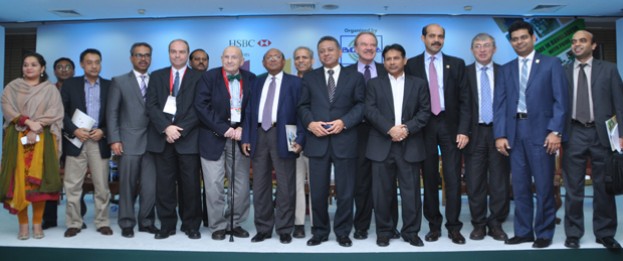


December 09, 2014
Assuring Workplace Tranquility
(Dhaka,8 December 2014) Dhaka Apparel Summit, 1st of its kind in Bangladesh, is being held at the Bangabandhu International Conference Center 7 December until 8 December 2014. The summit was organized by Bangladesh Garment Manufacturers and Exporters Association (BGMEA) in collaboration with Brand Forum Bangladesh.
Press Release- Session 7
The 7th session of the Dhaka Apparel Summit titled “Assuring Workplace Tranquility” was held at Bangabandhu International Conference Center (BICC) in Dhaka from 2.50 PM-4.05 PM on 8 December.
The session focused on how current labor relations in Bangladesh is causing workers dissatisfaction and untoward incidents that ultimately lead to reputation crises of the industry both at home and abroad, and also causes inconvenience to the buying community. The discussion will also shed lights on how could we turn around to tackle such difficulties living in the reality, and working out a pragmatic approach on 'how factories can limit or eliminate workplace unrest by negotiation, mediation and even arbitration of workplace disputes'. Most importantly the speakers tried to show how other countries have achieved success by limiting or eliminating workplace unrest and how companies and brands can do this in Bangladesh on their own, by developing in-house private programs without government intervention or control.
Opinions:
Thomas A. Kochan, Professor, Work and Employment Relations, Sloan School of Management, MIT, Bost, said that as we move up product sophistication brings the workforce along with the process is important.
Md. Shafiul Islam, Immediate Past President, BGMEA, said that BGMEA has an arbitration-cum-conciliation committee which has so far resolved more than eight thousands cases of disputes and grievances. BGMEA and BKMEA are working with government, brands, and other stakeholders to train mid-level management and workers in rights and responsibilities.
Arnold Marshal Zack, Professor, Harvard Law School, Boston, said, “You need to re-examine and reconsider the process and the way you are operating your business.” He said that mediation is a very good device and Bangladesh can make use of it. The mediator should be someone whom both parties trust.
Recommendations
Thomas A. Kochan, Professor, Work and Employment Relations, Sloan School of Management, MIT, Boston, recommended engaging employees and representatives of workers with process of development. He said that Bangladesh is one of the lowest price offering countries in the world. For most of the countries this time (offering of low price) lasts for few years and Bangladesh’s time is up. He also said that negotiations have to be legitimate and done regularly and continuously. There is should be a mechanism of negotiations before any problem arises. Just or fair supply chain cannot be ensured by anyone alone and it has to be done by all parties concerned. To ensure workplace tranquility all parties, including buyers, businessmen, NGOs, and workers, have to play their own roles.
Tuomo Poutiainen, Programme Manager, Ready Made Garment Sector, ILO-Dhaka, said the new generation who are on trade unions can change the scenario.
Arnold Marshal Zack, Professor, Harvard Law School, Boston, moderated the session.
Md. Shafiul Islam, Immediate Past President, BGMEA, Thomas A. Kochan, Professor, Work and Employment Relations, Sloan School of Management, MIT, Boston, and Tuomo Poutiainen, Programme Manager, Ready Made Garment Sector, ILO-Dhaka, , took part in the session as panel speakers.

Copyright © 2020, The Bangladesh Garment Manufacturers and Exporters Association.
Version-2.0, Design & Developed by Systech Digital Limited.
Version-2.0, Design & Developed by Systech Digital Limited.
